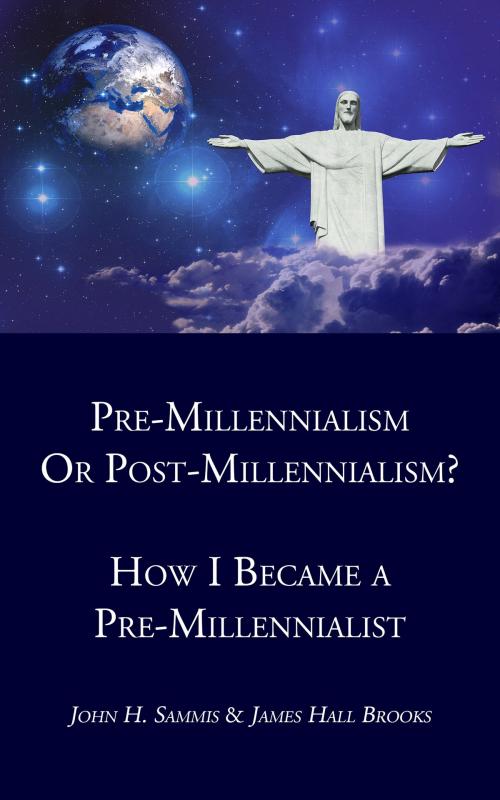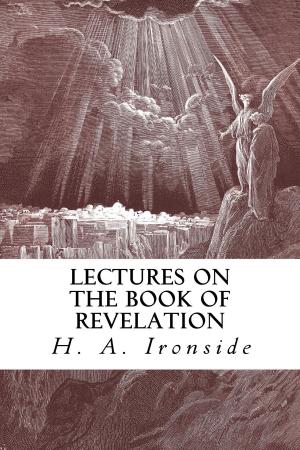Pre-Millennialism or Post-Millennialism? How I Became a Pre-Millennialist
Nonfiction, Religion & Spirituality, Bible & Bible Studies, Prophecies, New Testament, Study| Author: | John H. Sammis, James Hall Brooks | ISBN: | 1230001981551 |
| Publisher: | CrossReach Publications | Publication: | October 29, 2017 |
| Imprint: | Language: | English |
| Author: | John H. Sammis, James Hall Brooks |
| ISBN: | 1230001981551 |
| Publisher: | CrossReach Publications |
| Publication: | October 29, 2017 |
| Imprint: | |
| Language: | English |
Agreement has marked the evangelic faith always and everywhere in two things—(l) The Lord will return in His glorified humanity, and—(2) All nations shall ultimately constitute His Kingdom. That return is called the second advent, and the period of that universal Kingdom the millennium (or, after the Greek, the chiliad; in English “the thousand year”).
Disagreement has arisen as to the relative order of the two—Which comes first, the King or the Kingdom? Those who look for the King are called premillenialists, and those who look for the Kingdom postmillenialists. Postmillenialists, having removed all time limits from the term, regarding the “thousand years” as ideal, it is now common to discard the verbal distinctions and to yield the term to those who retain the hope and to call premillenialists millenarians, or chiliasts.
MILLENARIANS ARE A MINORITY. The multimillions of Roman and Greek Catholics and of English and American Protestants, are anti-millenarians. But the evangelical element of the Reformed Church on the Continent is said, on high authority, to be chiliastic. “Christendom,” however, as the name implies, is overwhelmingly of the opinion that the Kingdom precedes the advent.
IS THE MAJORITY RIGHT? Not necessarily. Enoch and Noah stood alone. Elijah led a forlorn hope among Israel’s millions. Micaiah was one among four hundred prophets. Our Lord and His disciples were a “little flock” in the First century, it was “Athanasius against the world” in the Fourth, and truth was still “on the scaffold” in the Sixteenth. If majorities were wrong in the past they may be in the present. That Christ “must needs suffer” was as clear in Moses and the prophets, though the Jews overlooked it, in the First century, as were the doctrines of grace, of the ministry, and of the Church, in the epistles, in the Sixteenth, when the Christians overlooked them. The majority may be as inexcusably “blinking in the noonday” now. “Blindness in part” has happened to some. Is it to the millenarians? If they were the “cranks,” “fanatics,” the “ignorant and foolish men,” “forbidding to preach the gospel to the Gentiles,” as some “affirm,” and “slanderously report,” we should answer, “Probably.”
Agreement has marked the evangelic faith always and everywhere in two things—(l) The Lord will return in His glorified humanity, and—(2) All nations shall ultimately constitute His Kingdom. That return is called the second advent, and the period of that universal Kingdom the millennium (or, after the Greek, the chiliad; in English “the thousand year”).
Disagreement has arisen as to the relative order of the two—Which comes first, the King or the Kingdom? Those who look for the King are called premillenialists, and those who look for the Kingdom postmillenialists. Postmillenialists, having removed all time limits from the term, regarding the “thousand years” as ideal, it is now common to discard the verbal distinctions and to yield the term to those who retain the hope and to call premillenialists millenarians, or chiliasts.
MILLENARIANS ARE A MINORITY. The multimillions of Roman and Greek Catholics and of English and American Protestants, are anti-millenarians. But the evangelical element of the Reformed Church on the Continent is said, on high authority, to be chiliastic. “Christendom,” however, as the name implies, is overwhelmingly of the opinion that the Kingdom precedes the advent.
IS THE MAJORITY RIGHT? Not necessarily. Enoch and Noah stood alone. Elijah led a forlorn hope among Israel’s millions. Micaiah was one among four hundred prophets. Our Lord and His disciples were a “little flock” in the First century, it was “Athanasius against the world” in the Fourth, and truth was still “on the scaffold” in the Sixteenth. If majorities were wrong in the past they may be in the present. That Christ “must needs suffer” was as clear in Moses and the prophets, though the Jews overlooked it, in the First century, as were the doctrines of grace, of the ministry, and of the Church, in the epistles, in the Sixteenth, when the Christians overlooked them. The majority may be as inexcusably “blinking in the noonday” now. “Blindness in part” has happened to some. Is it to the millenarians? If they were the “cranks,” “fanatics,” the “ignorant and foolish men,” “forbidding to preach the gospel to the Gentiles,” as some “affirm,” and “slanderously report,” we should answer, “Probably.”















